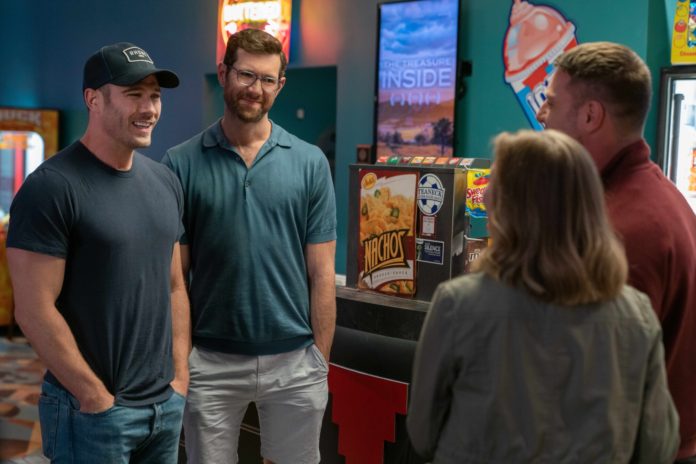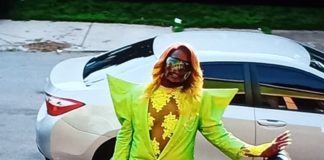Over the last decade, Luke Macfarlane has starred in more Hallmark Christmas movies than you can shake a mistletoe at, lending his square-jawed charisma to gauzy feel-good fantasies with titles like “Chateau Christmas,” “A Shoe Addict’s Christmas” and “Christmas in My Heart.”
But speaking by phone from Vancouver on a recent afternoon, the Canadian-born actor says the Hallmark project he’s currently shooting — working title “Christmas Village,” his 14th film for the network — will likely be his last.
“They’ve been very good to me, but I think I’ve told my story for now with those folks,” Macfarlane says. He lets out a self-deprecating laugh. “I mean, how many firefighters can I play?”
At an age when many actors see their opportunities begin to dwindle, Macfarlane — previously best known for his role as Scotty Wandell on the ABC drama “Brothers & Sisters” — is enjoying an improbable late-career breakthrough. The 42-year-old actor is set to star opposite Billy Eichner in “Bros,” the first romantic comedy from a major studio featuring an entirely LGBTQ principal cast.
A milestone in representation onscreen, bringing the raunchy R-rated comedy of films like “The 40 Year-Old Virgin” and “Bridesmaids,” to a gay love story with a wide release from Universal, the film hits theaters Sept. 30 following its premiere next week at the Toronto International Film Festival. Macfarlane plays Aaron, a jock-ish, commitment-phobic estate lawyer who finds himself falling for Eichner’s witty, hard-charging (and equally emotionally guarded) New York podcaster and museum curator Bobby.
When Macfarlane first came in to read for the role, director Nick Stoller (“Forgetting Sarah Marshall”), who co-wrote “Bros” with Eichner, was stunned that the Juilliard-trained actor wasn’t better known.
“When Luke walked in, I was like, ‘He should be Captain America!’“ says Stoller, who has gone on to cast Macfarlane as the husband of a character played by Rose Byrne in the AppleTV+ comedy series “Platonic.” “It’s totally crazy that he’s not really famous. He’s so good-looking but he’s also a really good actor and he’s very funny. And for someone who’s so good-looking, he’s weirdly relatable.”

Aaron (Luke Macfarlane) and Bobby (Billy Eichner) on a movie date in “Bros.”
(Nicole Rivelli / Universal Pictures)
While Eichner initially expected Universal Pictures to push for a bigger-name co-star — and perhaps even a heterosexual one — he was gratified to see Macfarlane get a chance to shine in the film, which is produced by comedy powerhouse Judd Apatow.
“Judd is known for discovering new, outside-the-box talent,” he says. “Whether it was Seth Rogen or Melissa McCarthy or Kumail Nanjiani or Amy Schumer, he has a long history of introducing a lot of hilarious fresh voices to the world. What’s so cool is that this is just like that, except it’s the LGBTQ version of it.”
So world, prepare to meet (or, if you’re a Hallmark movie aficionado, to re-meet) Luke Macfarlane.
What was going through your mind when you first went in to read for “Bros”?
I can’t actually remember another time that I had an audition for a studio film so I knew I had to take this very seriously. And when I read the script, I immediately had that feeling of, “Oh, this is a really good part for me. This is my part to get if I can just nail it in there.” I identified with Aaron. So many of his hang-ups were things that I understood and saw in my life and in my friends: how we hide parts of ourselves in order to appear a certain way to the world.

After a series regular role on ABC’s “Brothers & Sisters,” Luke MacFarlane became a Hallmark movie staple.
(Wesley Lapointe / Los Angeles Times)
Wait, how is it possible, with all your years of experience in Hollywood, that you had never auditioned for a studio film?
I was really asking myself that question — I mean, I certainly had never auditioned as a lead in a studio film. The fact is, I don’t think studio executives are saying, “Get me the gay guy from ‘Brothers and Sisters’ who does all those Hallmark films.” That’s probably not what people who run multibillion-dollar companies are thinking. [laughs]
You know, careers are funny. But I have always worked and I was grateful to work. And maybe part of it was also figuring out for myself what I really wanted and admitting that I wanted that. Growing up Canadian, we’re often taught to be a member of a company rather than to be the CEO.
Did you know going in that they were looking to cast an openly gay actor in that role?
I don’t think it was explicitly said to me but I think I knew in my gut that they wanted to do that. And I was incredibly grateful that that was my shot because in any audition if you bring, you know, Paul Rudd into the room and then you bring me in, it would be foolish for a studio to take me over Paul Rudd.
A lot of people have been asking me, “What was it like working with an all-LGBTQ cast?” I’ve been on a lot of sets, and the thing that was so unique about this set — aside from the fact that we had a little bit more in common with each other — was that there was no apathy. It was a bunch of people going, “Wow, we’re here and we’re so grateful. We’re going to work really hard because you gave us a shot.”
Billy told me the two of you made each other a little nervous and that helped feed into your chemistry together onscreen. Would you agree?
Billy is intimidating. He’s very intelligent and has famously made a career out of yelling truths at people and freaking them out. So yeah, I was certainly intimidated by him, by his sense of humor and comedy. He’s also very tall. But frankly, I was also intimidated to be on a set with Nick Stoller and [producer] Judd Apatow sitting behind the monitor. It was all intimidating.

When COVID-19 delayed filming of “Bros,” Luke Macfarlane and Billy Eichner had even more time to work on their characters.
(Nicole Rivelli/Universal Pictures)
You’ve had a lot of experience in the romantic comedy genre through your work in Hallmark films, generally playing straight characters. “Bros” is very much not a Hallmark movie — it actually includes some jokes about those movies — but what of that experience did you bring into this project?
One thing that I really enjoyed about making Hallmark movies is it’s really fun to flirt. It’s fun to play that energy on camera, where relationships are at their best in those early times. I guess Hallmark has given me a lot of flirting lessons.
While the cast of “Bros” is all LGBTQ and the film is very much about gay life and representation, your director was straight. How did that dynamic play out on the set?
We all have the ability to understand other people’s lives — that’s why we make movies. I can’t begin to make a list of all the sorts of various different things where people have not been bank robbers or motorcycle gang outlaws. But that’s what you do — you try to understand. Nick’s ability to understand our stories is why he’s a great director. He asked questions and was interested in the answers.
I remember during the rehearsal period I asked at one point whether safe-sex practices should be discussed in the movie at all. And there were a lot of different opinions on what that meant. The heterosexual community doesn’t have the same relationship with safe-sex practices as gay men have had to because of HIV/AIDS and now monkeypox. And Nick was willing and open to have those conversations. That’s the gift of any good creator. So I never felt uncomfortable and he was never uncomfortable.

Luke Macfarlane
(Wesley Lapointe/Los Angeles Times)
You came out in 2008 when Hollywood was in a very different place in terms of LGBTQ representation. Did you have any fears about what impact that could have on your career?
I definitely had people say, “You don’t have to do this.” But even years before, when I came out to my classmates at Juilliard, I thought, “This is going to make me a better actor because this is true.” And I think I felt the same way about the industry. It wasn’t going to make me a more famous actor — I certainly wasn’t selling books or trying to get a reality television show launched. It was just a deeper idea that your truth is more interesting than anything that you can fabricate and present to the world.
I’ll never know precisely how that impacted my career. I do remember someone once said to me, “Oh, Superman can’t be gay.” Offhand comments like that did resonate with me. But I’ll never know what conversations were had without me.
In the years since then, how have you seen gay representation evolve in Hollywood from your perspective?
We’re absolutely moving in the right direction despite what’s currently happening in our country with some of these rights being taken away. But it is interesting because when I first came to Hollywood and was taking general meetings, I remember thinking to myself, “Wow, there are a lot of gay people here. This lawyer. This casting director. This junior executive.” But then you kind of climb up the ladder a little bit more and you’re like, “Hmm, where did they go?” You know, I think we have a rich history of handing the king his meal.
Do you feel the weight of the pressure on this movie to perform at the box office because to prove that there’s a wide audience for a romantic comedy about two gay men?
Absolutely. I’m not someone who’s going to pull up the trade papers and look at box office trends. But I just finished filming [“Platonic”] with Seth Rogen, who has done this a lot, and he was talking about the movie and he mentioned an opening-weekend box office number that he said was very important: “You get that number and you know you’re okay.” And now I have this in my head. I don’t think anybody knows if that’s possible, and that’s a chance everybody’s taking.
If that rests on the fact that some people might be uncomfortable with two dudes kissing and they can’t see past that, that’s on them. But I do know in my heart that the movie is super funny, and funny is what people actually want to go see. And the specific always becomes universal. Yes, we’re dropped into a very specific upper-middle-class New York gay lifestyle. But the way people fall in love and what it means for them to take down their walls — that is a universal story that binds us all together.








